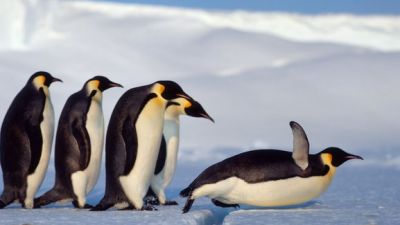Secret of how penguins survived the ice age revealed

A climate change study has located what was likely to have been the last refuge for one of only three populations of emperor penguins which survived the last ice age.
The Ross Sea in Antarctica is thought to have been a shelter for emperor penguins for thousands of years during the last ice age, about 19,500 to 16,000 years ago, when much of the rest of Antarctica was uninhabitable due to the amount of ice.
The study, published in the journal Global Change Biology, suggests that while current climate conditions may be perfect for emperor penguins, conditions in the past were too extreme for large populations to survive.
The species is famed for its adaptations to its icy world, breeding on sea ice during the Antarctic winter when temperatures regularly drop below minus 30C (minus 22F).
But the team discovered that conditions were probably too harsh for emperor penguins during the last ice age and that the population was roughly seven times smaller than today and split up into three nomadic populations.
Gemma Clucas, a PhD student from Ocean and Earth Science at the University of Southampton and one of the lead authors of the paper, said:
One of these polynyas that supported a population of emperor penguins throughout the last ice age was probably in the Ross Sea. The researchers found that emperor penguins that breed in the Ross Sea are genetically distinct from other emperor penguins around Antarctica.
A team of researchers was led by scientists from the universities of Southampton, Oxford, Tasmania and the Australian Antarctic Division, and supported in Antarctica by Adventure Network International, examined the genetic diversity of modern and ancient emperor penguin populations in Antarctica to estimate how they had been changing over time.